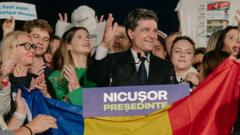In a race that kept observers on edge until late in the night, Nicusor Dan emerged victorious with 53.6% of the votes, decisively defeating George Simion of the far-right AUR party. Dan’s election was particularly noteworthy given the tense political atmosphere, stemming from last year's annulled presidential race amid allegations of Russian interference, which had stoked national discontent.
The elections saw participation from around 11.5 million voters, with Dan receiving more than six million votes. While Simion had initially gained traction during the first round, particularly among diaspora voters, his nationalist rhetoric ultimately could not compete with Dan’s vision of a pro-European Romania.
Upon securing his victory, Dan emphasized unity and collaboration, stating, "We need to build Romania together irrespective of who you voted for." His supporters celebrated fervently in the capital, expressing relief and hope for a future aligned with European ideals. The overwhelming turnout for Dan, especially among younger voters, illustrated a robust demand for change and a commitment to fighting corruption.
Simion’s contest against the backdrop of recent governmental collapse and his criticism of the EU was met with resistance as Dan advocated for continued support to Ukraine and EU partnership. Even as Simion celebrated his strong first-round performance, he was forced to concede defeat in the early hours after exit polls portrayed a stark reality.
The international community, including leaders from Ukraine and Moldova, swiftly congratulated Dan, heralding a potential strengthening of regional relationships focused on democratic values. European Commission President Ursula von der Leyen highlighted the significant voter turnout, noting the public's clear choice for a prosperous and open Romania in a united Europe.
Despite the defeat, Simion’s campaign resonated with a substantial section of the Romanian electorate, proving that nationalist sentiments remain palpable within the country. As Romania moves forward under Dan’s leadership, the lingering questions about the nation's direction and the appeal of nationalism in Romanian politics will continue to be a topic of discussion.
The elections saw participation from around 11.5 million voters, with Dan receiving more than six million votes. While Simion had initially gained traction during the first round, particularly among diaspora voters, his nationalist rhetoric ultimately could not compete with Dan’s vision of a pro-European Romania.
Upon securing his victory, Dan emphasized unity and collaboration, stating, "We need to build Romania together irrespective of who you voted for." His supporters celebrated fervently in the capital, expressing relief and hope for a future aligned with European ideals. The overwhelming turnout for Dan, especially among younger voters, illustrated a robust demand for change and a commitment to fighting corruption.
Simion’s contest against the backdrop of recent governmental collapse and his criticism of the EU was met with resistance as Dan advocated for continued support to Ukraine and EU partnership. Even as Simion celebrated his strong first-round performance, he was forced to concede defeat in the early hours after exit polls portrayed a stark reality.
The international community, including leaders from Ukraine and Moldova, swiftly congratulated Dan, heralding a potential strengthening of regional relationships focused on democratic values. European Commission President Ursula von der Leyen highlighted the significant voter turnout, noting the public's clear choice for a prosperous and open Romania in a united Europe.
Despite the defeat, Simion’s campaign resonated with a substantial section of the Romanian electorate, proving that nationalist sentiments remain palpable within the country. As Romania moves forward under Dan’s leadership, the lingering questions about the nation's direction and the appeal of nationalism in Romanian politics will continue to be a topic of discussion.





















